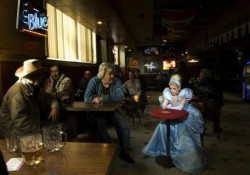For many little girls, fairytales were a staple of childhood development; the first book I ever read by myself was Alice Through the Looking Glass. Granted, there were a lot of lessons to be learned about being yourself and accepting others in Alice, the plot was so fantastical it didn’t really have the juice behind it to leave behind an unwanted personality trait or ass-backwards mentality about what life was supposed to be. However, most other fairytales, usually involving royalty, do. Many of our favorite tales involve a young girl (very young, usually 16-18) playing a victim and she needs to be saved. Saved from people who think she’s too pretty, or people who are pissed they didn’t get an invite to the her first birthday, or they just really needed a maid. Any parental figures are either completely absent or they’re bumbling idiots, and most of these girls are somehow incapable of saving themselves. So let’s take some individual looks at how most of us learned about love, I’ll also discuss the villain counterparts, and those handsome princes.
Cinderella
I won’t lie, this was one of my favorites, but the Disney version most kids are accustomed to made Cinder seem like such a victim. At least in Ever After they explained some reasoning as to why she decided to stay and play the role of servant to her ugly step family. She’s blindly optimistic, and probably would have lived out her days as housemaid had a magical fairy godmother not showed up out of nowhere to give the girl one shot at being hot enough to get some dude’s attention… the one and only dude powerful enough to take her away from her current situation and also make her family pay. So what did we learn as impressionable children:
1. ugly = evil
2. if you look hot enough a man will eventually love save you
Cinderella’s Diagnosis: Low Self-Esteem
Belle
Belle is definitely one I have an easier time looking up to; she liked to read, she held strong against the douchebag advances of Gaston (probably one of those guys who reads The Game or I Hope They Serve Beer in Hell). Remember the busty triplets who were all about him? Yeah, don’t be those girls. Anyway, Belle actually stands up for her family and sacrifices herself so her father can live. Even in her enslavement she is quite confident and never cowers from the treacherous beast. Here’s where it gets shaky: she falls for a “man” who threatened to kill her father, held her prisoner, and has serious anger-managment issues, and all of it was brought upon him because he was too good to help a poor homeless woman (ok, that’s pretty awesome). What we learned:
1. furry men are hot
2. even if he’s always angry and treats you like crap, he probably has a good heart, and you can change him.
Belle’s Diagnosis: Commitment Issues
Ariel
First of all, Ariel was 16. SIXTEEN! I wasn’t even done growing yet. This one is too easy. She wants to change who she is to be with a man, gives up her voice for it… so no deep convos there, must be a physical relationship. Then she backs out of the contract with Ursula by killing her, granted Ursula did play dirty. Why we all need therapy now:
1. if you really want him, change who you are.
2. the grass is greener on the other side.
3. get out of contracts by killing the other party, totally ok cuz you’re a princess.
4. as long as you’re hot enough you can have him, you don’t need to be able to carry a conversation.
Ariel’s Diagnosis: Low Self-Esteem
Aurora
Biznitch was asleep the whole time. What I learned:
1. you don’t have to do be awake to make your dreams come true.
2. first introduction to a spindle wheel, and don’t prick my finger on one.
3. keep my birthday parties private.
Aurora’s Diagnosis: Narcolepsy
Snow White
I feel bad for Snow White, she had that horribly high-pitched voice and everyone kept trying to kill her. Personally, if everyone was after me because my stepmom thought I was prettier than her, I certainly would not be taking apples from strangers. And can we just stop and take a second to recognize that she actually died! She wasn’t just asleep like Aurora, Snow White died and “true love’s kiss” brought her back. Lies I learned:
1. it’s ok to break into people’s houses if you’re pretty.
2. you don’t have to be alive for your dreams to come true.
3. beauty can be a curse.
Snow White’s Diagnosis: Stupidity Too Trusting, PTSD
Jasmine
Jasmine did have some gumption: “I am not a prize to be won!” <<— Favorite line. Everyone else in the story got on my nerves more than anything: Aladdin was selfish, and a thief (I get he was in hard times), but then he finds a magic lamp and lies to the girl he loves barely knows to get her to marry him, because she’s hot and she’s got the hook up. The crappy part is that she falls for it. Oh and her dad’s an idiot. What I took away:
1. lying will get you far, magic will get you even farther.
2. the richer you seem, the better.
Jasmine’s Diagnosis: Daddy Issues, Bipolar
The Princes
Most of the princes were all the same: They did all the dirty work, they usually only give a crap if the girl is pretty, they save the damsel in distress from some tragic evil, and changes her whole life by getting married. Most guys didn’t watch this crap so they’re often surprised when they are placed in the role of hero when they never asked to be. Most guys I know relate more to a Gaston type character, or an Aladdin than Prince Charming. And unfortunately, most women play the victim more than the hero. What this taught us:
1. always look good for your man.
2. the man will save you.
3. most men are gentlemen, and if he’s not, a good man will come along and kick his ass, and if he doesn’t… lose 10 pounds.
Overall Diagnosis: Superficiality, Low Self-Esteem
The Villains
I think most of the villains were bore out of jealousy over not receiving their happy ending. Either they weren’t attractive enough or their timing was off. My thoughts: real life is probably more like a villain’s tale than the poor little princess or well-to-do prince. However, the villains were usually incredibly intelligent, strategic, and sensitive – too sensitive. They were quite often made to look old, plain, or downright scary. I did learn from villains that revenge is not the answer, and I can be in control of my own life, and my own success.
Villain Diagnosis: Depression
Final Thoughts
Particularly when you hit your mid-twenties, college is over, the real world has not only begun it’s been real for a while, we start to realize things aren’t going the way we’d planned. When our happy ending falls out of reach, when pretty just isn’t enough, or the guy who learned how to be an asshole from books all the sudden reveals his true colors, their are no white horses, princesses aren’t always princesses, and someone is always lurking about just waiting to eat you alive – this is the time in the story when a hero usually comes, you settle, or you seek revenge. Unfortunately, one can’t place the burden of being a hero and saving little ole’ you onto someone else. This is your burden, take responsibility for yourself. Not only does it mend low self-esteem, it also creates opportunity and good timing. Now that’s a happy ending.



Recent Comments